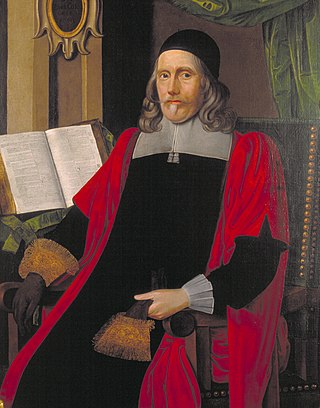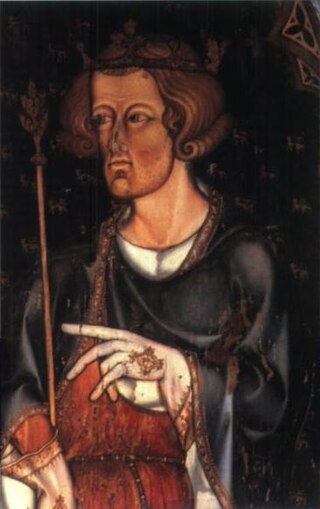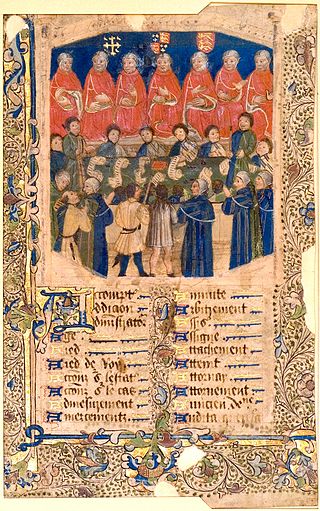Related Research Articles

Common law is the body of law created by judges and similar quasi-judicial tribunals by virtue of being stated in written opinions.

Magna Carta Libertatum, commonly called Magna Carta or sometimes Magna Charta, is a royal charter of rights agreed to by King John of England at Runnymede, near Windsor, on 15 June 1215. First drafted by the Archbishop of Canterbury, Cardinal Stephen Langton, to make peace between the unpopular king and a group of rebel barons, it promised the protection of church rights, protection for the barons from illegal imprisonment, access to swift and impartial justice, and limitations on feudal payments to the Crown, to be implemented through a council of 25 barons. As neither side stood by their commitments, the charter was annulled by Pope Innocent III, leading to the First Barons' War.

The Bill of Rights 1689 is an Act of the Parliament of England that set out certain basic civil rights and clarified who would be next to inherit the Crown. It remains a crucial statute in English constitutional law.
Due process of law is application by the state of all legal rules and principles pertaining to a case so all legal rights that are owed to a person are respected. Due process balances the power of law of the land and protects the individual person from it. When a government harms a person without following the exact course of the law, this constitutes a due process violation, which offends the rule of law.

In the field of jurisprudence, equity is the particular body of law, developed in the English Court of Chancery, with the general purpose of providing legal remedies for cases wherein the common law is inflexible and cannot fairly resolve the disputed legal matter. Conceptually, equity was part of the historical origins of the system of common law of England, yet is a field of law separate from common law, because equity has its own unique rules and principles, and was administered by courts of equity.

English law is the common law legal system of England and Wales, comprising mainly criminal law and civil law, each branch having its own courts and procedures.

Sir Edward Coke was an English barrister, judge, and politician. He is often considered the greatest jurist of the Elizabethan and Jacobean eras.
Richard was a medieval Benedictine monk and Archbishop of Canterbury. Employed by Thomas Becket immediately before Becket's death, Richard arranged for Becket to be buried in Canterbury Cathedral and eventually succeeded Becket at Canterbury in a contentious election. Much of Richard's time as archbishop was spent in a dispute with Roger de Pont L'Evêque, the Archbishop of York over the primacy of England, and with St Augustine's Abbey in Canterbury over the archbishop's jurisdiction over the abbey. Richard had better relations with King Henry II of England than Becket had and was employed by the king on diplomatic affairs. Richard also had the trust of the papacy and served as a judge for it. Several of his questions to Pope Alexander III were collected into the Decretals, a collection of ecclesiastical laws, and his patronage of canon lawyers did much to advance the study of canon law in England.
A writ of prohibition is a writ directing a subordinate to stop doing something the law prohibits. This writ is often issued by a superior court to the lower court directing it not to proceed with a case which does not fall under its jurisdiction.
Case law, also used interchangeably with common law, is a law that is based on precedents, that is the judicial decisions from previous cases, rather than law based on constitutions, statutes, or regulations. Case law uses the detailed facts of a legal case that have been resolved by courts or similar tribunals. These past decisions are called "case law", or precedent. Stare decisis—a Latin phrase meaning "let the decision stand"—is the principle by which judges are bound to such past decisions, drawing on established judicial authority to formulate their positions.
An ecclesiastical court, also called court Christian or court spiritual, is any of certain courts having jurisdiction mainly in spiritual or religious matters. In the Middle Ages, these courts had much wider powers in many areas of Europe than before the development of nation states. They were experts in interpreting canon law, a basis of which was the Corpus Juris Civilis of Justinian, which is considered the source of the civil law legal tradition.

A consistory court is a type of ecclesiastical court, especially within the Church of England where they were originally established pursuant to a charter of King William the Conqueror, and still exist today, although since about the middle of the 19th century consistory courts have lost much of their subject-matter jurisdiction. Each diocese in the Church of England has a consistory court.

The Statutes of Mortmain were two enactments, in 1279 and 1290, passed in the reign of Edward I of England, aimed at preserving the kingdom's revenues by preventing land from passing into the possession of the Church. Possession of property by a corporation such as the Church was known as mortmain, literally "dead hand". In medieval England, feudal estates generated taxes for the King, principally on the grant or inheritance of the estate. If an estate became owned by a religious corporation which could never die, could never attain majority, and could never be attainted for treason, these taxes never became payable. It was akin to the estates being owned by the dead, hence the term.

The Court of High Commission was the supreme ecclesiastical court in England, from the inception of King Henry VIII's Act of Supremacy in 1534 to 1689, with periods of time where there was no court activity, like in 1641, when Parliament disbanded the court with the Triennial Act. John Whitgift, the Archbishop of Canterbury, obtained increased powers for the court by the 1580s. He proposed and had passed the Seditious Sectaries Act 1593, making Puritanism an offence.
Derogation is a legal term of art, which allows for part or all of a provision in a legal measure to be applied differently, or not at all, in certain cases. The term is also used in Catholic canon law, and in this context differs from dispensation in that it applies to the law, whereas dispensation applies to specific people affected by the law.

The Court of Common Pleas, or Common Bench, was a common law court in the English legal system that covered "common pleas"; actions between subject and subject, which did not concern the king. Created in the late 12th to early 13th century after splitting from the Exchequer of Pleas, the Common Pleas served as one of the central English courts for around 600 years. Authorised by Magna Carta to sit in a fixed location, the Common Pleas sat in Westminster Hall for its entire existence, joined by the Exchequer of Pleas and Court of King's Bench.
The phrase law of the land is a legal term, equivalent to the Latin lex terrae, or legem terrae in the accusative case. It refers to all of the laws in force within a country or region, including statute law and case-made law.
Richard Cosin was an English jurist. He became prominent as an ecclesiastical lawyer in the service of Archbishop John Whitgift, active against the Puritans in the Church of England.
Sir Nicholas Fuller was an English barrister and Member of Parliament. After studying at Christ's College, Cambridge, Fuller became a barrister of Gray's Inn. His legal career there began prosperously—he was employed by the Privy Council to examine witnesses—but was hampered later by his representation of the Puritans, a religious tendency which did not conform with the established Church of England. Fuller was repeatedly in contention with the ecclesiastical courts, including the Star Chamber and Court of High Commission, and was once expelled for the zeal with which he defended his client. In 1593 he was returned as the Member of Parliament for St Mawes, where he campaigned against the extension of recusancy laws. Outside of Parliament, he successfully brought a patents case which not only undermined the right of the Crown to issue patents but accurately predicted the attitude taken by the Statute of Monopolies two decades later.

The law of trusts was constructed as a part of "Equity", a body of principles that arose in the Courts of Chancery, which sought to correct the strictness of the common law. The trust was an addition to the law of property, in the situation where one person held legal title to property but the courts decided it was fair just or "equitable" that this person be compelled to use it for the benefit of another. This recognised as a split between legal and beneficial ownership: the legal owner was referred to as a "trustee" and the beneficial owner was the "beneficiary".
References
- ↑ HAMPDEN, Renn Dickson. The Case of Dr. Hampden. The Official and Legal Proceedings Connected with the Appointment of Dr. Hampden to the See of Hereford, Including the Principal Documents Connected with this Important Controversy, and a Translation of All the Extracts. With Notes and an Appendix: 1848. Pages 135-135.
- ↑ Clegg, Cyndia Susan (2001). Press Censorship in Jacobean England. United Kingdom: Cambridge University Press. p. 129.
- ↑ Kesselring, K.J; Stretton, Tim (2022). Marriage, Separation, and Divorce in England, 1500-1700. United Kingdom: Oxford University Press. p. 91.
- ↑ Brooks, Christopher W. (2019). "Religion and Law in Early Modern England". In Lobban, Michael; Begiato, Joanne; Green, Adrian (eds.). Law, Lawyers and Litigants in Early Modern England: Essays in Memory of Christopher W. Brooks. United Kingdom: Cambridge University Press. pp. 338–339. ISBN 9781108491723.
- ↑ Brooks, Christopher W. (2009). Law, Politics and Society in Early Modern England. United Kingdom: Cambridge University Press. p. 121. ISBN 9780521323918.